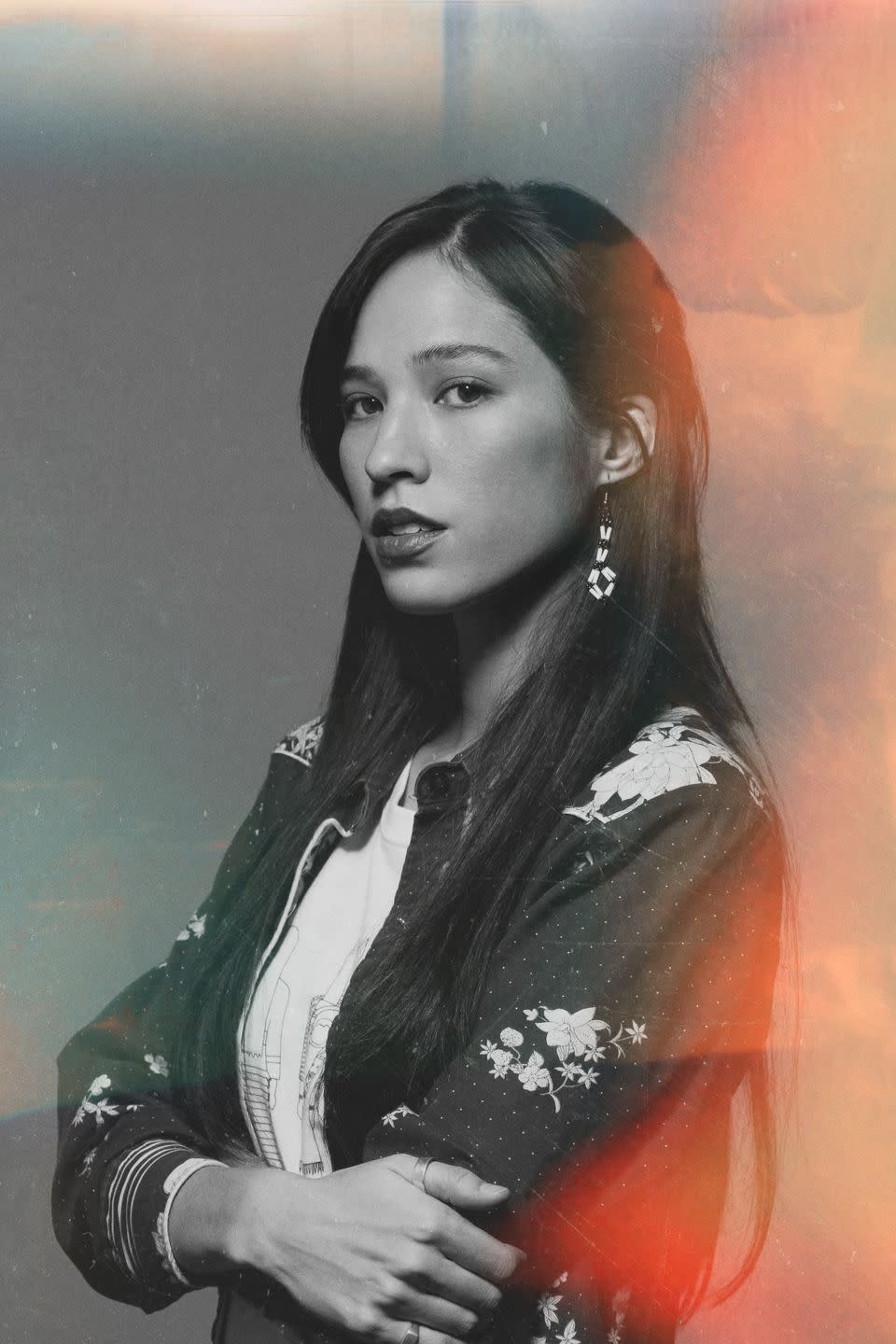My Dinner Date with 'Yellowstone's Kelsey Asbille and Her Mushroom Rice

- Oops!Something went wrong.Please try again later.
Kelsey Asbille begins our cooking demonstration with a disclaimer: "I'm like the worst cast member you could ask to cook. I'm so nervous right now." And sure, there may be someone on the Yellowstone roster who could make something more culinary and complicated (Asbille insists Eden Brolin, who plays Mia, is the actress you want in your kitchen), but the actress has chosen the quintessential dish of any cooking-averse Southerner tasked with bringing something to the potluck for our virtual get-together: a casserole.
Truth be told, a casserole is one of the greatest gifts you can give to someone. (Or make for yourself.) They're notoriously easy to craft, despite coming with very particular instructions. It's like a family heirloom you can pass onto friends, and, the best part, they're usually even better after a day in the fridge. Tonight, our varietal of the special species is what she calls "Church Lady Rice." Over Zoom, we begin. Asbille, in her Brooklyn kitchen wearing an oversized black t-shirt, explains that the Beef Consomé and French Onion soup used for her dish must be Campbell's. She can't explain why exactly, but the insistence makes sense to me, a fellow Southerner—the key to the best casseroles is honoring those specific touches. "I tried the Wolfgang Puck French onion soup. That shit was nasty," she says with a laugh before turning anxious again. "I'm just kidding, but it was just... bland. Now I'm going to get in trouble with Mr. Puck."
The Church Lady Rice—a mix of mushrooms, canned soup, rice, and far too much butter for our hearts but not for our souls—bakes in the oven for 50 minutes, so in the interim, Asbille and I talked more about the food we loved as opposed to the food we make on our own. (Also, where we left Monica at the end of Yellowstone Season Four.) As a South Carolinian, there are a few hometown staples that are important to her, but there are also the meals that meet at intersection of her own identity as a Chinese-American. Her Chinese grandmother lived next door, available for authentic Northern-style dishes every Monday and Wednesday. And her grandmother on the other side had a catering company. So Asbille may admit to not being a great cook herself, but she knows her way around a mighty fine dish.
This interview has been edited and condensed for clarity.
Kelsey Asbille: I'm like the worst cast member you could ask to cook. I'm so nervous right now.
Justin Kirkland: Don't be. When this recipe came through, I saw it and said, “This is food from where I come from. This is East Tennessee church food.”
K.A.: I actually called this "Church Lady Rice." The best meal in town was always right after church. My grandmother and her friends would make just the best spread in the whole world. So yeah, so I learned how to make this rice and it's honestly my party trick now.
The first time my boyfriend saw me make this, he was like what are you doing? I was like just trust me, you're going to love it. It looks kind of nasty while you're doing it.
JK: Now, I know you said it has to be Campbell's, which I love. But I want you to explain—what's the situation there?
KA: It's just got to be Campbell's because nothing else works. It just doesn't taste the same. In my grocery store, they didn't have Campbell's one time, so I tried the Wolfgang Puck French onion soup. That shit was nasty. I'm just kidding, it was just bland… Now I'm going to get in trouble with Mr. Puck. The only thing that really is consistent is Campbell's.
JK: Well, while we wait for our James Beard award, I've got a few other questions for you. Where does this recipe fit within your life and your family?
KA: My mom's mom has a catering company. So I was around good food all the time. Southern food is so important to me. It's so sentimental and emotional. It was a way of bringing home to me or yeah. I also just love when people love it as well. It's nice to cook for everyone and have them enjoy it.
JK: What were some of your mom's staples growing up?
KA: My first interaction was really when we would go see my grandmother. She loved to fish and so she would make this fried catfish or any kind of fried fish, like fried trout. It was really good. Peach ice cream, homemade. Then my mom makes a really good spaghetti and a really good Kid Cuisine. She's not going to like that one. I'm going to get in trouble for that one.
JK: You also have dishes, I'm sure, from your Chinese family, that have also been passed down.
KA: My grandmother on my dad's side lived next door. So she would make Chinese food growing up, on Mondays and Wednesdays we'd have her food. It was like Northern Chinese home-cooked meals. Alongside like my maw maw's fried catfish, you'd have this beautiful Chinese dish. Food has always been something emotional, something nostalgic for me.

JK: When it comes to telling stories from different backgrounds, I feel like Yellowstone has tackled a topic that we haven't seen much on TV prior with its willingness to show indigenous people and talk about indigenous rights and the violence that happens against that community.
KA: It's something that I'm really proud of. Like, we were talking about being mixed race… it feels really alienating at times. You have this permanent identity crisis going on in your head. So for me, it was a way to connect to that part of who I am through stories and especially... You're working alongside Mo, Grimes, Kelly, and Gil Birmingham. They have been just really important people in my life.
What I love about [creator] Taylor [Sheridan]'s work is that I do believe he believes that social change does come through the arts. In terms of creating a meaningful conversation and that goes for, I think, our native viewers and our non-native viewers.
JK: I feel like I've learned so much watching Yellowstone. The way the show depicted the sterilization storyline that happened last season. I had no idea.
KA: I think that ended in the '70s, so it hasn't been that long ago. Same as the residential school as well, which I think hopefully, we're bringing more light towards becoming more of a conversation. The arts is a way of communication that can be really powerful.
My dad is not the most emotional guy, but I will never forget watching... I don't know which episode. It was Master of None. You know the episode where they go back to their parents and everything that they did to come to the U.S.? And then their kid just sits on the couch and says, “I'm going to play on my iPad real quick.” My dad thought it was so funny and was like, “Let's watch it again.” We watched that set sequence a couple of times because it's a conversation that you're having with your parents without directly speaking to each other.
JK: Now in your own series, I’m hoping that, provided there’s a next season, we get to see more of Monica. You tend to have your life on the line at least once a season.
KA: It's true. I think that's a recurring theme in everything I do with Taylor. When I found out Monica was pregnant [this season], I was like, “No! This is very dangerous.” Especially for Kayce, Monica and Tate are his stakes. He loses his soul without them, in a way. In saying that, I'm excited for them. I hope things go well. I do like though that Taylor already knows the ending and we're slowly inching towards that. We’re going to hopefully end it with a bang.

JK: When you're out in Montana, how long are you out there shooting? And what’s the food situation like?
KA: About four or five months. There’s this one spot called The Creamery—or it's called Lifeline—I guess. Not trying to blow up that spot because I need to go back there, but they have the best meat cuts and the best produce and cheese and everything. It truly was a lifeline for us, especially last season because we were shooting during the pandemic and keeping a very tight bubble. So we were cooking a lot more. I don't know if I was cooking so much, but I was making rice. But often, we also did Sunday pancakes with Eden and her husband and Jeff. That became like a really nice tradition of also just kind of talking about the week and the world and making sense of it all.
JK: A lot of people initially thought Yellowstone was a show that appeals to a conservative audience, but it's exploded, becoming what feels like a universal hit.
KA: I only knew people were watching the show when I'd go home [to South Carolina] at first. It was a real difference to when I'd come back to New York and now, I'm starting to see that bleed over in a really crazy way that I don't really know how to make sense of. So honestly, it's terrifying that people watch the show. Luke [Grimes] actually texted me the other day, “This season's hitting different?” I'm like yeah, even in New York, yeah, it feels kind of strange. Truly, I don't know how to process it.
I didn't realize how nice of a balance it is to have Brooklyn and Montana be my home. I can't wait to go back. Every now and again, you got to get out of the city and go be in nature.
JK: In your ideal world, as a fan, what does Season Five look like for Monica and Kayce?
KA: As a fan? I don't know, I trust Taylor. I'm okay with whatever road we go down. Maybe throw a wrench in the works. But, in saying that, I feel like that kind of happens every season. Maybe the craziest thing to happen is that she has her beautiful baby and they just live happily ever after? But no, maybe something out of character for Monica would be kind of neat to play. It is not easy to be married to a Dutton, alright? Maybe the most fun thing honestly, next season, I’d like to wear a fur coat. Can Monica raid Beth's wardrobe?
JK: So, typically, when we pitch this, I say send me a recipe that matters. Sometimes you get Kimchi-jjigae, sometimes you get Frito-pie. You chose Church Lady Rice. Why does this recipe matter?
KA: It matters because it brings back my maw maw. It brings back when I was a kid after church, and we’d go and see those ladies for the best buffet of your life. I think it's memory. It’s a way that I get to remember her and honor her. It means a lot, too, when my mom's like, "Hey, what's the recipe for that rice again?" It's almost like I get to bring it back to my family as well. It matters.
You Might Also Like

